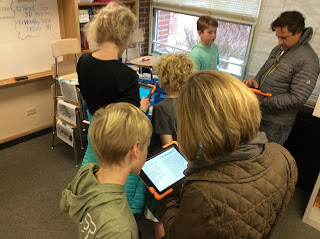With CDO Revising, the kids go through a three step process for each sentence of their work:
- Compare: Does this sentence match what I really want it to mean?
- Diagnose: What is the problem? (too long, too short, missing words, unclear...)
- Operate: How will I fix my sentence? (write more, break it up, re-write...)
Each day in class, we've practiced this method with one paragraph of our literary argument essays. Students have practiced using the method independently and with a partner. Partner work with this method can be especially helpful because partners don't know what you meant to say. They can help pick up errors that your brain allows you to miss.
Each evening, we've assigned the kids to try the method again with a part of the informational writing they've completed for their Characteristics of Civilizations projects. We're hoping this method become a lifelong strategy they are comfortable using again and again.
Characteristics of Civilizations
Students have completed their research for a civilization of choice, and they have written sections for a book about their civilization based on that research. We are currently working on revising that writing. Next week we will begin the editing process.
In groups, students are creating "experiences" for the class. These experiences are based on their research, but they will allow visitors to experience the ancient civilization in a meaningful way. Visitors will be able to walk through an Egyptian tomb, tour the Great Wall of China, participate in a scavenger hunt, visit the Greek Agora (marketplace) and so many other things! Here's a peak into the work they've been doing to prepare their experiences:
 |
| A student creates a sign for his ancient China experience. |
 |
| Students work together to write a script for a game show they will film, edit and present. |
 |
| Students work together to make a model of the Roman Colosseum. |
 |
| A student works with Ms. Dolkart to cut cardboard for an ancient Egyptian artifact. |
 |
| A student works on an image for the wall of his group's Egyptian tomb. |
 |
| A student works on making a replica of a flag for her Roman experience. |
 |
| A student creates a necklace for her group's Egyptian tomb. |
 |
| A student shows off her Greek wardrobe. |
What has impressed me the most so far is the amount of stamina and perseverance the kids have shown! Our work days have been long, but each day when it's time to clean up I hear, "That's all the time we've got today?!" I don't have every supply that they will need, and supplies get forgotten at home, but that hasn't stopped a single group. Students have done a great job reaching out to Mr. Greenman, Mr. Weir, Ms. Wild and Ms. Antman to get necessary supplies and workspace. They've been very helpful and kind to one another. It's awesome to see them come together as such a community of learners!
You are welcome to join us for our experiences on Thursday, May 4th. Please let me be very up front with you: this is going to be organized chaos and not what you're used to when you come to our room. The kids have worked very hard, but due to the nature of their experiences, there is no way to put exact times on the group presentations themselves. So, to that end, please come if you can, but bring your open-mindedness and patience!
- Warner Advisory Experiences: Thursday, May 4th from 10:00-11:30
- Barbaro Advisory Experiences: Wednesday, May 3rd from 1:45-2:45 OR Thursday, May 4th from 1:45-2:45
- Egypt, China and Rome will be Wednesday
- India and Greece will be Thursday
A Book Recommendation: Powerless by Matthew Cody
It's a little bit realistic fiction, a little bit superhero sci-fi, and it's all fun! When Daniel moves to Noble's Green, he's very aware that something is different with the kids there. He soon learns that superpowers are real, but will the kids be able to use their superpowers for the right reasons? "With great power comes great responsibility." It's a great read, and it's a series!












